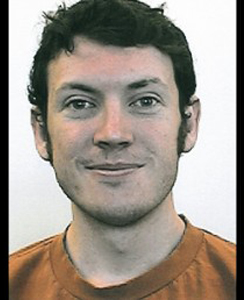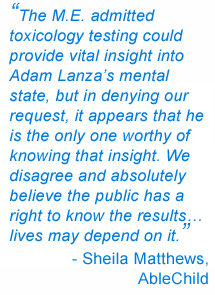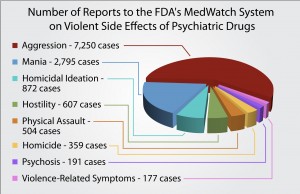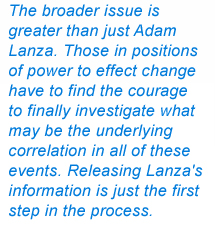By Kelly Patricia O’Meara
April 5, 2013

“Why Adam Lanza did this, and if there is a contributing factor that is apparent from an assessment of his autopsy and prescription drug history, it is important to enable we – the public – and in particular AbleChild, an organization that interacts with caregivers, parents and legislators on issues relating to parental rights, to discover the truth.” Jonathan Emord, Attorney
Despite a formal request from AbleChild, a Parent’s Rights organization, citing numerous state and federal laws supporting the release of Adam Lanza’s toxicology results and medical records, Connecticut Medical Examiner, H. Wayne Carver, M.D., has arbitrarily denied the request.
The M.E.’s decision to withhold the information is at odds with Connecticut law, the State’s Constitution, federal law and the United States Constitution. In response, AbleChild has filed an appeal with the State’s Freedom of Information Commission (FOIC) for the release of the records and, if necessary, is prepared to take the case to the U.S. Supreme Court.
While state and federal legislators are pouring hundreds-of-millions of dollars into increased mental health treatment for school-age children, the question that has yet to be answered is what drove the alleged shooter, Adam Lanza, to become a killer. And, more to the point, one which can only be answered by the M.E., is whether Lanza, yet another in a long line of school shooters, was under the influence of psychiatric drugs.
This is not an unimportant question given the history of the numerous adverse effects associated with prescription psychiatric drugs and which, is well-documented by international drug regulatory agencies reporting that prescription psychiatric drugs can cause violent, aggressive, psychotic, suicidal and even homicidal behavior.

Colorado shooter James Holmes was under the care of psychiatrist Lynne Fenton prior to the shootings. Newly released documents reveal police found an antidepressant and anti-anxiety drugs in Holmes’ apartment.
This horrific event is not the first of its kind. For example, the recently released information regarding Aurora, Co., movie theatre shooter, James Holmes, revealed that a cocktail of prescription mind-altering drugs had been found in Holmes’ apartment, including sedatives, the anti-anxiety drug clonazepam and the antidepressant sertraline, a generic version of Zoloft.
And there are other numerous recent examples of violent acts where there is documented proof that prescription psychiatric drugs have been involved. That state and federal lawmakers are unwilling to investigate the connection between psychiatric drugs and violence only serves to place communities throughout the nation in danger of similar tragic events. And, based on statements made by the M.E., there seems little doubt that he is very aware of this possibility.
The M.E. has publicly admitted that the toxicology results have potential value. As reported in a January 11, 2013 Connecticut Post article, “Carver said tests are done to determine if the person had taken any type of drug that might ‘affect behavior.’ He said these would include psychiatric medications used to treat anxiety, seizures and other issues. In this particular toxicology test, Carver said he would be looking for the ‘presence or absence’ of particular drugs. He said the result could provide “potentially valuable information in creating a full picture of Lanza.”
 Sheila Matthews, a founder of AbleChild, understands the immediate implications of the Lanza toxicology results saying, “the M.E. admitted toxicology testing could provide vital insight into Adam Lanza’s mental state, but in denying our request, it appears that he is the only one worthy of knowing that insight. We disagree and absolutely believe the public has a right to know the results…lives may depend on it.”
Sheila Matthews, a founder of AbleChild, understands the immediate implications of the Lanza toxicology results saying, “the M.E. admitted toxicology testing could provide vital insight into Adam Lanza’s mental state, but in denying our request, it appears that he is the only one worthy of knowing that insight. We disagree and absolutely believe the public has a right to know the results…lives may depend on it.”
Yes, lives may depend on the information gleaned from Lanza’s toxicology results because the broader issue is greater than just Adam Lanza. Those in positions of power to effect change have to find the courage to finally investigate what may be the underlying correlation in all of these events. Releasing Lanza’s information is just the first step in the process.
Jonathan Emord, an attorney with the Washington, D.C.-based law firm, Emord & Associates, filed the appeal for AbleChild and is clear on the organization’s, and the nations, right to the information. “It is of compelling public interest,” explains Emord, “why Adam Lanza did this, and if there is a contributing factor that is apparent from an assessment of his autopsy and prescription drug history, it is important to enable we – the public – and in particular AbleChild, an organization that interacts with caregivers, parents and legislators on issues relating to parental rights, to discover the truth.”

Reports from 2004-2011. Note: The FDA estimates that less than 1% of all serious events are ever reported to it. Click image for more info.
“The release of the information,” says Emord, “directly affects the democratic system by ensuring full information so legislators and other public policy leaders act in ways that are tailored to address the precise harm created by Lanza and others. If it is the case that shooters like Lanza are suffering from a mental defect, one would want to know that steps were taken that would minimize the risk of harm resulting from the defect, or were they given substances that are known to increase the risk of harmful behavior. If so, we need to reconsider public policy and legislation so it is focused more toward identifying those who have the potential for creating this risk to society and ensuring that they are not given substances that would aggravate that tendency.”
“There is no sound justification,” explained Emord, “for the M.E. to keep this information confidential. There is no interest of the M.E. that is equal to or greater than the public interest in determining the cause of this mass murder suicide. There is an undoubted First Amendment right of access to this information. Lanza committed a mass murder and suicide and that is of keen interest to the people of Newtown and people across the nation, which is part of an apparent epidemic of related shootings, murders and suicides. As a consequence, there is a pressing legislative interest in the states and the federal government to find ways to curb this violence.”
 “In the end,” says Emord, “the withholding of this information is a detriment to public safety. The M.E. is making a decision of nondisclosure that could cost lives. The need for this information is compelling and the time table is critical. He is acting as if he is above the law and he needs to comply with the law.”
“In the end,” says Emord, “the withholding of this information is a detriment to public safety. The M.E. is making a decision of nondisclosure that could cost lives. The need for this information is compelling and the time table is critical. He is acting as if he is above the law and he needs to comply with the law.”
As explained in the 27-page appeal, there are no privacy issues at stake in the case of Adam Lanza, release of the toxicology results and medical records do not fall under the HIPAA laws and there is no conflict with any possible on-going criminal investigation.
While it is yet unclear whether Lanza will end up among a list of 31 school-related acts of violence (including shootings, bombs and stabbings) where the perpetrator was found to be under the influence of psychiatric drugs, what is clear is that the question must be asked and answered… what, if any, role did psychiatric drugs play in the murderous rampage?
The mere fact that a private organization, such as Ablechild, is forced to litigate in order to obtain information that should have been immediately requested by lawmakers and made public should be unacceptable to anyone interested in getting to the bottom of what occurred in Newtown.
Nevertheless, AbleChild is hopeful that the state FOIC will comply with the law. Based on that state agency’s decision, the organization is prepared to move forward if necessary. According to the organization’s attorney, Jonathan Emord, “the M.E. does not have the luxury of denying access to those who have a legitimate interest. He is not the last word on the matter. People want to know if Lanza’s behavior is linked to psychiatric drugs. That information may add to the picture about how best to respond.”
—
Kelly Patricia O’Meara is an award winning investigative reporter for the Washington Times, Insight Magazine, penning dozens of articles exposing the fraud of psychiatric diagnosis and the dangers of the psychiatric drugs – including her ground-breaking 1999 cover story, Guns & Doses, exposing the link between psychiatric drugs and acts of senseless violence. She is also the author of the highly acclaimed book, Psyched Out: How Psychiatry Sells Mental Illness and Pushes Pills that Kill. Prior to working as an investigative journalist, O’Meara spent sixteen years on Capitol Hill as a congressional staffer to four Members of Congress. She holds a B.S. in Political Science from the University of Maryland.


SHARE YOUR STORY/COMMENT